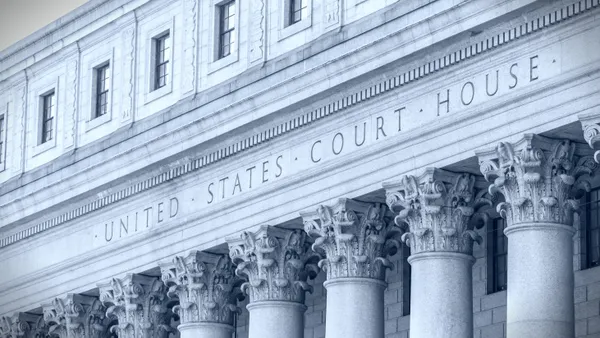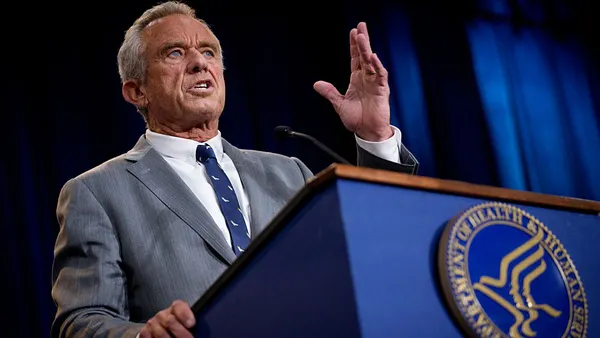Dive Brief:
- Amid a slowdown of initial public offerings held up by the largely shuttered Securities and Exchange Commission, some companies that planned to go public in the first few months of 2019 are mulling a legal workaround to bypass regulators.
- Some biotechs in the midst of the IPO process are considering the unusual step of using a technical amendment to their registration forms and listing publicly without final SEC clearance, legal experts said in interviews.
- But as companies consider the move, the Nasdaq stock exchange has begun adopting a case-by-case approach in deciding whether it will allow IPOs that haven't fully cleared the SEC review, several sources familiar with the matter told BioPharma Dive.
Dive Insight:
As the government shutdown lingers with few signs of progress, the IPO market — and by extension emerging companies in biotech and other industries — has felt the effects of a hamstrung SEC.
Before a lapse in funding closed large parts of government offices in late December, private companies were proceeding through the IPO process as usual. But the shutdown has put a freeze on the typical dialogue between commission employees and filing companies.
The absence of IPOs so far this month stands in stark contrast to last year's January, which was the busiest month for IPOs since 2000, according to PwC. All told, there were 47 IPOs in the first quarter of 2018.
Some biotechs potentially impacted include Gossamer Bio, Alector and Cirius Therapeutics, all of which are actively attempting an IPO. One biotech, Alzheon, notified the SEC on Jan. 16 that it would withdraw its registration statement and is no longer pursuing an IPO, but did not give a reason for that decision. Alzheon also withdrew an earlier attempt to go public.
One workaround is a legal exception, lawyers said, where a company modifies the language in its registration filing with the SEC to bypass whatever remains of their SEC review, moving directly to market.
This alternative route requires a company to pick a price for its IPO and then wait 20 days, with a listing fixed at that price.
Michael Bison, a partner at Goodwin, said this method, while technically legal, is seldom used in normal circumstances. It exposes the company to "a fair amount of market risk," he said in an interview, noting the potential risks in market fluctuations during that waiting period.
Still he said companies were increasingly weighing it as an option to secure needed funding, a point echoed by other lawyers.
But while it might be legal, the Nasdaq appears wary.
The exchange where biotechs often debut is now grappling with how to deal with companies that may make that change, as it opens up the possibility of newly minting public companies that could face disputes with the SEC once the government reopens.
"There certainly could be someone who's been through several rounds, who is far enough along, that they are very comfortable in saying they've cleared all their comments [with the SEC]," Andrew Fabens, a partner at Gibson, Dunn & Crutcher, a law firm, said in an interview with BioPharma Dive. "Theoretically, that's possible."
Even when the funding is restored at the SEC, agency workers will have to dig themselves out of a backlog of work that continues to pile up.
"I think interest from investors in the IPO market remains strong, however I am concerned about the potential backlog of offerings," Matthew Feinberg, a managing director at the investment bank B. Riley FBR, said in a statement provided to BioPharma Dive. "Once the government reopens, it may create some challenges for competing companies with similar stories, but I don’t expect that to have a major impact on the quality names."
Fabens said the only thing certain about the backlog is that there will be one, and a large one at that. It's unclear how the SEC would prioritize that work, or whether they would decide to expedite reviews.
The government shutdown has put pressure on the pharma and biotech industries, affecting multiple agencies that work with both sectors. In addition to the SEC, the Food and Drug Administration and the Treasury Department have been impacted, holding consequences for some drug companies.
The FDA can't review drugmaker applications for product approvals submitted after Dec. 22, for instance, as the agency can't accept new user fees during a lapse in funding. Commissioner Scott Gottlieb has estimated the agency will exhaust its remaining balance for Prescription Drug User Fee Act programs by around mid-February.
Even the private market could feel an impact, Bison said. A pilot program operated by the Treasury Department requires pre-clearance in certain circumstances for foreign investment into U.S. companies or technologies. Those filings are not being reviewed during the shutdown as well, making it increasingly difficult to take money from investors outside the U.S.
"I think it will have a lasting effect on the industry both from an operational perspective and also in accessing public markets," Bison said.













